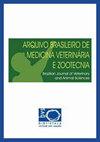Surgical removal of periocular neoformation in Peixe -Kinguiu (Carassius Auratus) submitted to anesthesia with propofol in combination with morphine - case report
IF 0.5
4区 农林科学
Q4 VETERINARY SCIENCES
Arquivo Brasileiro De Medicina Veterinaria E Zootecnia
Pub Date : 2023-06-01
DOI:10.1590/1678-4162-12676
引用次数: 0
Abstract
ABSTRACT Different anesthetic agents are commonly used during procedures performed in aquaculture to minimize stress and maximize fish welfare during handling. A Kinguio fish was treated with a history of a mass near the left eye. In the clinical evaluation, a pedunculated neoformation was found in the periocular region. The fish was submitted to anesthesia for surgical removal of the mass, which was later referred to histopathological evaluation, revealing myxoma. The anesthesia protocol used 1% propofol at a concentration of 5 mg/liter of water and morphine at a dose of 5 mg/kg, intramuscularly. Immediately after the end of the procedure, the fish was returned to the aquarium and its anesthetic recovery was observed. The objective of this report is to describe a surgical procedure in kinguio fish and to determine the efficacy of propofol associated with morphine in this species. As a result, complete immobilization of the fish was obtained with propofol, reaching the fourth stage of anesthesia and the administration of morphine suggested being able to provide effective and long-lasting analgesia. It is concluded that despite the positive results obtained, anesthesia in fish still needs to be extensively investigated to refine analgesia protocols during procedures that cause pain and stress.丙泊酚复合吗啡麻醉下应用手术切除金桂鱼眼周新生血管1例
摘要水产养殖过程中通常使用不同的麻醉剂,以最大限度地减少处理过程中的压力并最大限度地提高鱼类的福利。一条金桂鱼因左眼附近有肿块病史而接受治疗。在临床评估中,在眼周区域发现有带蒂新生血管。将该鱼进行麻醉以手术切除肿块,随后进行组织病理学评估,发现粘液瘤。麻醉方案使用浓度为5mg/l水的1%丙泊酚和剂量为5mg/kg的吗啡,肌肉注射。手术结束后,立即将鱼送回水族馆,观察其麻醉恢复情况。本报告的目的是描述金龟鱼的手术过程,并确定丙泊酚与吗啡联合使用对该物种的疗效。结果,丙泊酚使鱼完全固定,达到麻醉的第四阶段,吗啡的给药表明能够提供有效和持久的镇痛。结论是,尽管取得了积极的结果,但在导致疼痛和压力的手术中,鱼类的麻醉仍需广泛研究,以完善镇痛方案。
本文章由计算机程序翻译,如有差异,请以英文原文为准。
求助全文
约1分钟内获得全文
求助全文
来源期刊
CiteScore
0.80
自引率
25.00%
发文量
111
审稿时长
9-18 weeks
期刊介绍:
Publica artigos originais de pesquisa sobre temas de medicina veterinária, zootecnia, tecnologia e inspeção de produtos de origem animal e áreas afins relacionadas com a produção animal. Atualmente a revista mantém 628 permutas (419 internacionais e 209 nacionais), sendo um verdadeiro suporte para o recebimento de periódicos pela Biblioteca da Escola.
A partir de 1999, a Escola de Veterinária delegou à FEP MVZ Editora o encargo do gerenciamento e edição de todas suas publicações, inclusive do Arquivo, ficando somente com o apoio logístico (instalações, equipamentos, pessoal etc.). O apoio financeiro é exercido pelo CNPq/FINEP e pela própria FEP MVZ.

 求助内容:
求助内容: 应助结果提醒方式:
应助结果提醒方式:


